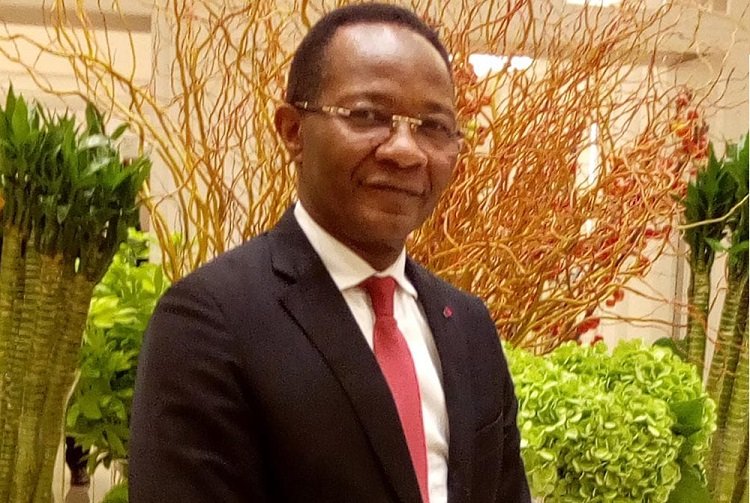POLITICS - JEAN BLAISE GWET: " If France wants to stop the spread of anti-French sentiment in Africa, it must let Cameroonians freely choose their candidate in 2025."

Jean Blaise GWET : gives us through this interview some lines of his program on the Anglophone crisis, the economy, youth, women, the state of the opposition, the issue of the status of former heads of state and the Frankist Movement.
His words suggest that he is well on his way for assuming the duties of Head of State.
The Anglophone crisis promises to be a major issue in the presidential campaign. What do you propose to resolve it?
JB GWET : Since 2017, Cameroon has been in the grip of a deadly conflict in the two English-speaking regions of the Northwest and Southwest. This conflict has already caused the death of more than 4,000 civilians; nearly 700,000 people are internally displaced and today, more than 1.5 million are in need of humanitarian assistance.
One thing is certain: if nothing is done, other pockets of tension are likely to open up and we will be heading straight for a civil war that could contaminate the entire sub-region.
I deplore the fact that to date there is no credible agenda for negotiations that could bring about peace and reconciliation.
What do you think of those Cameroonians who believe that there will only be change in Cameroon through arms?
JB GWET : The exasperation of Cameroonians in the face of the multiple crises that our country is going through, among others in Noso, can prevent some of our fellow citizens from thinking: they are thus forced to summon even chaos to serve as an escape route.
Unfortunately, Cameroonians love their nation and are not ready for chaos. As a proof, during the last presidential elections, only 3 590 681 Cameroonians voted out of a population of 26 514 652.
My mission is to reassure our desperate brothers by telling them about the psychology of the Cameroonian, peaceful at heart and inhabited by a secular responsibility to protect the land of our ancestors and his own property.
It is the depth of this attachment that imprints in me the firm conviction that the shortcuts privileged by adventurers will have difficulty to prosper in Cameroon.
Moreover, I am doing my utmost to ensure that the changeover announces and prefigures the rise of our country to the green heights from which it should never have descended.
I therefore invite all my brothers and sisters to join us in this new work of building a new Cameroon, so that we walk together towards the essential: To build together a strong, prosperous and united nation.
What would you say about the need for "better decentralization" that could go as far as federalism?
JB GWET : The grievances of Anglophones are deep but have not been addressed. Anglophone Cameroonians have long complained about the almost total domination of public life by Francophones, whose elite use their power to marginalize them in the allocation of resources for economic development. They feel that whenever they have protested, they have been severely repressed both under Ahmadou Ahidjo's administration (1960-1982) and under Paul Biya's since 1982.
From my point of view, each region should benefit equally from our wealth. Anglophones want to participate equitably in the management, not only of the North-West and South-West regions, but of the whole of Cameroon.
- We can adopt a stronger regionalism, but not a federation.
- We must send them a sign of peace: I am ready to engage in the necessary negotiations for peace and reconciliation.
But I believe that it is up to Cameroonians to decide on this issue through the National Assembly or by referendum.
Paul BIYA has not yet declared his candidacy. Do you think he will?
JB GWET : The question is not whether Paul Biya will be a candidate or not.
The question is to know what legacy we want to leave to our children?
We must have the courage to face reality: Cameroonians are waiting for change. We must put in place the conditions of life that promote peace, social cohesion and the blossoming of each citizen. This requires a strong economy, controlled urbanization, health coverage for every Cameroonian citizen, life insurance for the military and police, dual citizenship and active involvement of the Diaspora in public, economic and social life in Cameroon. Impossible is not Cameroonian.
If you are elected, what will become of President Paul BIYA?
JB GWET : I am in favour of a special status for the former President of the Republic and his family who will enjoy all the honours and privileges due to their rank. Paul BIYA must be able to retire peacefully in his country. His experience and advice will be useful to me to govern Cameroon tomorrow.
I am also in favor of the rehabilitation of President Ahmadou Ahidjo and the return of his remains to his native land.
What would you do with the former dignitaries imprisoned under Operation Sparrowhawk?
JB GWET : I am in favor of their release. The important thing is not to have them behind bars, but to recover the money diverted, to create industries, to offer jobs to the youth, to put in place justice for all, without any witch-hunt.
We will make sure that those who come to office do not come to plunder public property. We must fight nepotism, corruption and put work back at the center of the values of the Republic. I want to make Cameroon a land of prosperity and modernity. We must dispel the fear of change, because it is necessary for the development of our country and our people.
At the economic level, what kind of change are you talking about?
JB GWET : Private investment should be encouraged and the economy should be boosted. The idea of an African currency is also to be considered. But we should not be afraid of the renationalization of the water, energy, rail and air transport sectors either.
The presidential election is a one-round affair. What can the opposition parties do against a party with a majority in both houses of parliament? Wouldn't the lack of a coalition cause the opposition to lose?
JB GWET : For my part, Cameroon would gain by organizing a two-round presidential election with a term limit of 5 years for the head of state, renewable once. This is necessary for any democratic country, which presents several candidates to a presidential election.
I take advantage of your interview to salute the courage and contribution of our elders in politics. Chairman John FRUDI, Minister of State Bello BOUBA MAIGARI, Minister Issa TCHIROMA, Me YONDO Black, the late Minister Augustin Fréderic KODOK etc. Without forgetting the one who made this democracy possible, President Paul BIYA. Each candidate has certainly some good, but it is our turn. With deep conviction, I know that we will win the next presidential election, for the peace and happiness of our people.
Nevertheless, I must acknowledge that the political framework influences the strategies of the opposition political parties in their attempts to gain power at the top of the state. Of course, we know that in Africa, political parties in power use public resources to campaign and often tend to monopolize the public media, leaving little opportunity for the opposition to address the people properly.
Coalition agreements between opposition parties are sometimes necessary to facilitate a change of government, as together they have a good chance of defeating the ruling party. But very often, given their often divergent and selfish objectives, they never manage to reach an agreement.
It is a question today of looking the truth in the face and understanding that things are getting worse and worse in our country and that the Cameroonian people are demanding that power be handed over to them. My mission and my duty is to restore hope and confidence to our people. I pledge to do so in 2025.
I ask all my elders in politics, all the political parties of the majority and the opposition, my brother and elder Maurice KAMTO, to join us in this new work of national reconstruction, so that together we bring to our people the hope and happiness they are waiting for.
Mr. President, what program do you have for the youth and women?
JB GWET : Youth and Women are central to my Commitments for Cameroon, new generation from 2025. We will put in place youth and women employment programs. These programs will allow each young person and each woman to get a job when they leave school or training.
I will have a majority of young people and women at the head of all the positions of the Nation: in the City Councils, Regional Councils, National Assembly, Senates, Ministers, State and Parastatal Companies.
With regard to politics in particular, I will give young people and women the taste and desire to engage in politics. Because it is not politics that does not fascinate, but it is the way it is done in our country that does not interest anyone. I encourage them to stand up in their villages, in their cities, in their regions, to run for all elected positions. I will validate all their lists at the next elections.
What do you think of Frankism, this movement of succession from father to son?
JB GWET : The presidency of a country is far from being a monarchy. Africa has become the continent par excellence where, in some countries when the father is no longer in business, it is the son who takes the reins. Examples of certain countries, which I will not mention, speak volumes about this pattern.
But I trust the wisdom and foresight of President Paul BIYA, who certainly knows that leaving his son in this position would be a disservice to the Nation, to himself and especially to his son who may suffer the same fate as the son of a former president in West Africa. I think that he should let his son live his life in Cameroon quietly. If he wants to participate in the affairs of the nation, I will be happy to work with him, as with every Cameroonian.
It is said that rumors have spread around the world that President Macron has visited Cameroon to endorse the son.
JB GWET : If France wants to stop the spread of anti-French sentiment in Africa, it must let Cameroonians freely choose their candidate in 2025. This time we are ready.
Thank you Jean Blaise GWET for this interview.
JB GWET : I am the one thanking you.










